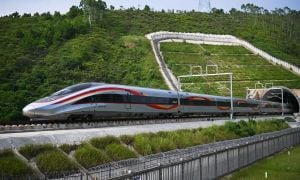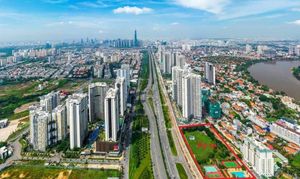Buritipu, located in northeastern Brazil, is facing a significant crisis as homes begin to sink due to severe landslides and soil erosion, leading local authorities to declare a state of emergency for the city of approximately 55,000 residents.
According to reports from Reuters, officials have noted alarming developments over recent months, with large sinkholes appearing close to residential areas. "The size of the sinkholes has increased exponentially, coming dangerously close to residential houses," said local government authorities, highlighting the urgency of the situation.
Close to 1,200 residents are now at risk of losing their homes, with the alarming trend of ground subsidence threatening the integrity of entire streets. The problem isn’t new; it has been brewing for nearly three decades due to heavy rains gradually washing away the soil. "We have been noticing the soil eroding for some time," stated Lucas Conceição, Minister of Public Works and Engineering. He pointed out the exacerbation caused by human factors, such as deforestation and inadequately planned urban development.
Buritipu has long been susceptible to the natural elements, but recent climate patterns have escalated the issue significantly. The heavy rains, compounded by man-made interventions, have rendered the sandy soil particularly unstable. It’s not just the homes at risk; the very foundation of the city appears to be crumbling beneath the residents.
Officials are working to devise emergency response plans, including evacuation procedures, as the situation develops. This active management is necessary to mitigate the risk to life and property, with authorities currently assessing dangerous structures and implementing safety measures.
Despite these efforts, there are concerns over the adequacy of local government resources to effectively address the crisis. Minister Conceição admitted, "We are facing significant limitations on resources to resolve this ground subsidence issue. We need more support to help stabilize the area. There’s only so much we can do with limited funding and manpower." This stark reality highlights the need for comprehensive disaster management strategies moving forward.
Residents express anxiety and uncertainty as they watch the ground beneath their feet literally slip away. One local resident mentioned, "It’s frightening to see the ground open up near our homes; we just want to feel safe here." The emotional toll on the community is palpable, as fear mounts over potential evacuations and permanent displacement.
This situation poses questions not only for Buritipu but also for broader environmental practices throughout Brazil’s Amazon region, which is critically affected by deforestation and climate change. The balance between development and environmental preservation must become central to policy decisions now more than ever, as communities like Buritipu confront the consequences of inadequate urban planning mixed with natural occurrences.
Experts are calling for immediate action to prevent future occurrences. An integrated approach involving environmental conservation, sustainable land management, and effective urban planning could pave the way for safer living conditions. While there isn't a quick fix to Buritipu's plight, the current crisis serves as a wake-up call for all municipalities dealing with similar environmental challenges.
The people of this Brazilian city, with its unique ecological backdrop, deserve solutions grounded not only in immediate relief but also informed by long-term strategies aimed at creating resilience against the powerful forces of nature.
It remains to be seen how Buritipu navigates through these treacherous circumstances. For now, the community stands resilient, united by the collective hope for safety and the urge to rethink the relationship between nature and urban living.



